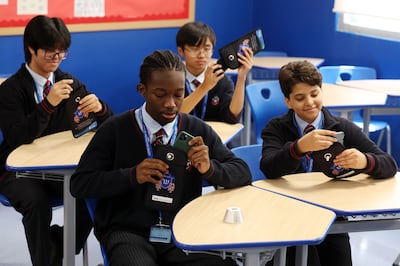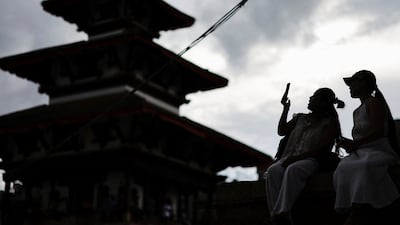Three disparate events in the past few days – the Red Sea internet cable issue, the blocking of some social media platforms in Nepal that sparked protests and, more locally, recent updates regarding the use of smartphones in schools – offer a discursive glimpse at how societies think about the digital world and the broader relationships we all have with technology.
First, the cable cut. It became a big story over the weekend with internet services being reduced to a crawl in parts of the Middle East and South Asia after some Red Sea communication lines were apparently severed. Experts suggest the disruption was most likely the result of a commercial shipping activity, such as a dropped and dragged anchor, rather than the work of a nefarious group. Whatever the cause, repair work is likely to be time-consuming, expensive and complex.
For the average technology dependent person, it may mean some bumps in the road in their day-to-day digital life while relevant authorities devise workarounds to keep communication channels moving. But this is also a short but uncomfortable step into the unknown. We just don’t know whether life will be affected or not from hour to hour.
Anecdotal evidence suggests disruption is now low level, but the incident is a reminder that most of us also find any uncertainty or unknown hard to process. Even small inconveniences become perceived as much larger glitches than they are and can push anxiety levels higher.
The unrest in Nepal over the past few days has provided another perspective on the darker side of disruption and denial of access to digital assets.
While those protests later mutated into severe and deadly violence – more than 20 people have died since unrest began – the roots of the crisis lay in the decision to ban Facebook, X and YouTube over failure to comply with newly introduced registration rules in the country and gave life to a larger protest movement.
Before the ban was imposed, the government in Nepal said regulations had been designed to stop the spread of fake news, hate speech and cybercrime. When protests and violence followed, access to those platforms was reinstated, the prime minister resigned and the government said it would work to address the broader demands of demonstrators.
Recent history provides many adjacent examples. The 2011 uprisings in Egypt were, perhaps, the first example of protesters using social media to organise and communicate with a global audience and achieve their goals. A proposed tax on WhatsApp in Lebanon in October 2019 drew swift popular criticism and was withdrawn within hours, but protests simmered thereafter. Both cases remind us that the digital version of the town square of old remains a crowded and often transformative space.
The third recent example is an evolution of school policy mandates more locally. Public schools in the UAE have adopted a stricter line on mobile-phone use within their grounds this year, matching moves made elsewhere in the world. Changes of policy are evident in private schools, too.
The issue of phone use in schools is divisive and contested, like large tracts of the digital world itself. Those who support bans say they make students more focused during school hours, while others maintain that there are circumstances where students should be permitted to carry their phones and have access to them. We often talk about education needing to prepare students for the working world they will move into, which is one that is, for better or worse, powered by smartphones and digital communication.
The internet, once considered a disruptor, is now a run-of-the-mill utility with associated expectations
One parent told The National that our phones are an addiction: “Our children need traditional ways of writing, reading and interacting to develop … not social media”, while another said: “for many parents, being able to reach our children during the day is essential”. Few of us have neutral opinions on the matter.
A couple of years ago, I wrote in these pages about no-phones policies at entertainment venues, arguing for relaxation of rules at comedy shows and music concerts that required attendees to put their phones in pouches for the duration of the performance. The column was met with some robust disagreement on social media, underscoring the very polarised nature of this issue.
All three stories speak to our attitudes to digital disruption, denial of service in the wider sense of the words and growing global technology dependency. The internet, once considered a disruptor, is now a run-of-the-mill utility with associated expectations. Outage begets outrage.
Having captured large tracts of the attention economy, platforms are regulation resistant institutionally. Their users either coalesce in the same free-for-all area or want the exact opposite to counter their influence. The middle ground may well be more fertile.
More specifically, societies used to think about signal and noise as opposite terms. Recent events tell us that many people want both signal and noise – and they want it all the time.
The biog
Name: Abeer Al Bah
Born: 1972
Husband: Emirati lawyer Salem Bin Sahoo, since 1992
Children: Soud, born 1993, lawyer; Obaid, born 1994, deceased; four other boys and one girl, three months old
Education: BA in Elementary Education, worked for five years in a Dubai school
ESSENTIALS
The flights
Emirates flies direct from Dubai to Rio de Janeiro from Dh7,000 return including taxes. Avianca fliles from Rio to Cusco via Lima from $399 (Dhxx) return including taxes.
The trip
From US$1,830 per deluxe cabin, twin share, for the one-night Spirit of the Water itinerary and US$4,630 per deluxe cabin for the Peruvian Highlands itinerary, inclusive of meals, and beverages. Surcharges apply for some excursions.
GOLF’S RAHMBO
- 5 wins in 22 months as pro
- Three wins in past 10 starts
- 45 pro starts worldwide: 5 wins, 17 top 5s
- Ranked 551th in world on debut, now No 4 (was No 2 earlier this year)
- 5th player in last 30 years to win 3 European Tour and 2 PGA Tour titles before age 24 (Woods, Garcia, McIlroy, Spieth)
Key findings of Jenkins report
- Founder of the Muslim Brotherhood, Hassan al Banna, "accepted the political utility of violence"
- Views of key Muslim Brotherhood ideologue, Sayyid Qutb, have “consistently been understood” as permitting “the use of extreme violence in the pursuit of the perfect Islamic society” and “never been institutionally disowned” by the movement.
- Muslim Brotherhood at all levels has repeatedly defended Hamas attacks against Israel, including the use of suicide bombers and the killing of civilians.
- Laying out the report in the House of Commons, David Cameron told MPs: "The main findings of the review support the conclusion that membership of, association with, or influence by the Muslim Brotherhood should be considered as a possible indicator of extremism."
CABINET%20OF%20CURIOSITIES%20EPISODE%201%3A%20LOT%2036
%3Cp%3E%3Cstrong%3EDirector%3A%20%3C%2Fstrong%3EGuillermo%20del%20Toro%3Cbr%3E%3Cstrong%3EStars%3A%3C%2Fstrong%3E%20Tim%20Blake%20Nelson%2C%20Sebastian%20Roche%2C%20Elpidia%20Carrillo%3Cbr%3ERating%3A%204%2F5%3C%2Fp%3E%0A
The smuggler
Eldarir had arrived at JFK in January 2020 with three suitcases, containing goods he valued at $300, when he was directed to a search area.
Officers found 41 gold artefacts among the bags, including amulets from a funerary set which prepared the deceased for the afterlife.
Also found was a cartouche of a Ptolemaic king on a relief that was originally part of a royal building or temple.
The largest single group of items found in Eldarir’s cases were 400 shabtis, or figurines.
Khouli conviction
Khouli smuggled items into the US by making false declarations to customs about the country of origin and value of the items.
According to Immigration and Customs Enforcement, he provided “false provenances which stated that [two] Egyptian antiquities were part of a collection assembled by Khouli's father in Israel in the 1960s” when in fact “Khouli acquired the Egyptian antiquities from other dealers”.
He was sentenced to one year of probation, six months of home confinement and 200 hours of community service in 2012 after admitting buying and smuggling Egyptian antiquities, including coffins, funerary boats and limestone figures.
For sale
A number of other items said to come from the collection of Ezeldeen Taha Eldarir are currently or recently for sale.
Their provenance is described in near identical terms as the British Museum shabti: bought from Salahaddin Sirmali, "authenticated and appraised" by Hossen Rashed, then imported to the US in 1948.
- An Egyptian Mummy mask dating from 700BC-30BC, is on offer for £11,807 ($15,275) online by a seller in Mexico
- A coffin lid dating back to 664BC-332BC was offered for sale by a Colorado-based art dealer, with a starting price of $65,000
- A shabti that was on sale through a Chicago-based coin dealer, dating from 1567BC-1085BC, is up for $1,950
COMPANY%20PROFILE
%3Cp%3E%3Cstrong%3EName%3A%20%3C%2Fstrong%3ESmartCrowd%0D%3Cbr%3E%3Cstrong%3EStarted%3A%20%3C%2Fstrong%3E2018%0D%3Cbr%3E%3Cstrong%3EFounder%3A%20%3C%2Fstrong%3ESiddiq%20Farid%20and%20Musfique%20Ahmed%0D%3Cbr%3E%3Cstrong%3EBased%3A%20%3C%2Fstrong%3EDubai%0D%3Cbr%3E%3Cstrong%3ESector%3A%20%3C%2Fstrong%3EFinTech%20%2F%20PropTech%0D%3Cbr%3E%3Cstrong%3EInitial%20investment%3A%20%3C%2Fstrong%3E%24650%2C000%0D%3Cbr%3E%3Cstrong%3ECurrent%20number%20of%20staff%3A%3C%2Fstrong%3E%2035%0D%3Cbr%3E%3Cstrong%3EInvestment%20stage%3A%20%3C%2Fstrong%3ESeries%20A%0D%3Cbr%3E%3Cstrong%3EInvestors%3A%20%3C%2Fstrong%3EVarious%20institutional%20investors%20and%20notable%20angel%20investors%20(500%20MENA%2C%20Shurooq%2C%20Mada%2C%20Seedstar%2C%20Tricap)%3C%2Fp%3E%0A
Miguel Cotto world titles:
WBO Light Welterweight champion - 2004-06
WBA Welterweight champion – 2006-08
WBO Welterweight champion – Feb 2009-Nov 2009
WBA Light Middleweight champion – 2010-12
WBC Middleweight champion – 2014-15
WBO Light Middleweight champion – Aug 2017-Dec 2017
Killing of Qassem Suleimani
COMPANY%20PROFILE
%3Cp%3E%3Cstrong%3ECompany%20name%3A%3C%2Fstrong%3E%20Alaan%3Cbr%3E%3Cstrong%3EStarted%3A%3C%2Fstrong%3E%202021%3Cbr%3E%3Cstrong%3EBased%3A%3C%2Fstrong%3E%20Dubai%3Cbr%3E%3Cstrong%3EFounders%3A%3C%2Fstrong%3E%20Parthi%20Duraisamy%20and%20Karun%20Kurien%3Cbr%3E%3Cstrong%3ESector%3A%3C%2Fstrong%3E%20FinTech%3Cbr%3E%3Cstrong%3EInvestment%20stage%3A%3C%2Fstrong%3E%20%247%20million%20raised%20in%20total%20%E2%80%94%20%242.5%20million%20in%20a%20seed%20round%20and%20%244.5%20million%20in%20a%20pre-series%20A%20round%3Cbr%3E%3Cbr%3E%3C%2Fp%3E%0A
Seven tips from Emirates NBD
1. Never respond to e-mails, calls or messages asking for account, card or internet banking details
2. Never store a card PIN (personal identification number) in your mobile or in your wallet
3. Ensure online shopping websites are secure and verified before providing card details
4. Change passwords periodically as a precautionary measure
5. Never share authentication data such as passwords, card PINs and OTPs (one-time passwords) with third parties
6. Track bank notifications regarding transaction discrepancies
7. Report lost or stolen debit and credit cards immediately
How Beautiful this world is!
UAE currency: the story behind the money in your pockets
Ain Dubai in numbers
126: The length in metres of the legs supporting the structure
1 football pitch: The length of each permanent spoke is longer than a professional soccer pitch
16 A380 Airbuses: The equivalent weight of the wheel rim.
9,000 tonnes: The amount of steel used to construct the project.
5 tonnes: The weight of each permanent spoke that is holding the wheel rim in place
192: The amount of cable wires used to create the wheel. They measure a distance of 2,4000km in total, the equivalent of the distance between Dubai and Cairo.
The biog
Name: Timothy Husband
Nationality: New Zealand
Education: Degree in zoology at The University of Sydney
Favourite book: Lemurs of Madagascar by Russell A Mittermeier
Favourite music: Billy Joel
Weekends and holidays: Talking about animals or visiting his farm in Australia



